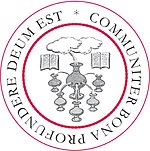Library Company of Philadelphia
 |
|
| Established | 1731 |
|---|---|
| Location | Philadelphia |
| Collection | |
| Size | 500,000 books; 70,000 other items |
| Access and use | |
| Circulation | Non-circulating collection |
| Population served | Free and open to the public |
| Other information | |
| Director | Richard S. Newman |
| Staff | 28 |
| Website | http://www.librarycompany.org/ |
Coordinates: 39°56′52″N 75°09′47″W / 39.94779°N 75.16306°W
The Library Company of Philadelphia (LCP) is a non-profit organization based in Philadelphia. Founded in 1731 by Benjamin Franklin as a library, the Library Company of Philadelphia has accumulated one of the most significant collections of historically valuable manuscripts and printed material in the United States.
The current collection size is about 500,000 books and 70,000 other items, including 2,150 items that once belonged to Franklin, the Mayflower Compact, major collections of 17th century and Revolution-era pamphlets and ephemera, maps, and whole libraries assembled in the 18th and 19th centuries. The collection also includes first editions of Moby-Dick and Leaves of Grass.
The Library Company was an offshoot of the Junto, a discussion group in colonial Philadelphia, that gravitated around Benjamin Franklin. On July 1, 1731, Franklin and a number of his fellow members among the Junto drew up articles of agreement to found a library, for they had discovered that their far-ranging conversations on intellectual and political themes floundered at times on a point of fact that might be found in a decent library. In colonial Pennsylvania at the time there were not many books; Books from London booksellers were expensive to purchase and slow to arrive. Franklin and his friends were mostly of moderate means, and none alone could have afforded a representative library such as a gentleman of leisure might expect to assemble. By pooling their resources in pragmatic Franklinian fashion, as the Library Company's historian wrote, "the contribution of each created the book capital of all."
...
Wikipedia
